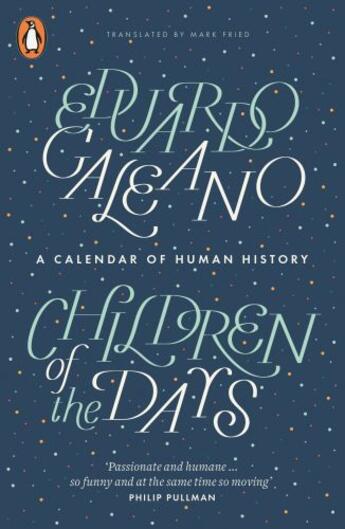-
Nombre de pages : (-)
-
Collection :
(-)
-
Genre :
(-)
-
Thème :
Non attribué
-
Prix littéraire(s) :
(-)
Résumé:
From Eduardo Galeano, one of Latin America's greatest living writers, author of the Memory of Fire trilogy, comes Children of the Days a new kind of history that shows us how to remember and how to live This book is shaped like a calendar. Each day brings with it a story: a journey, feast or... Voir plus
From Eduardo Galeano, one of Latin America's greatest living writers, author of the Memory of Fire trilogy, comes Children of the Days a new kind of history that shows us how to remember and how to live This book is shaped like a calendar. Each day brings with it a story: a journey, feast or tragedy that really happened on that date, from all possible years and all corners of the world. From Abdul Kassem Ismail, the tenth-century Persian who never went anywhere without his library - all seventeen thousand books of it, on four hundred camels; to the Brazilian city of Sorocaba, which on February 8 1980 responded to the outlawing of public kissing by becoming one huge kissodrome; to July 1 2008, the day the US government decided to remove Nelson Mandela's name from its list of dangerous terrorists, Children of the Days takes aim at the pretensions of official history and illuminates moments and heroes that we have all but forgotten. Through this shimmering historical mosaic runs a common thread, one that joins humanity's darkest hours to its sweetest victories. Children of the Days is the story of our lives.
'Galeano performs the sort of extraordinary feats of compassion, artistry, and imagination achieved in fiction by his fellow visionary Latin American writers, especially Borges, García Màrquez, and Bolaïo' Booklist, starred review 'Galeano's prose is nearly lulling in its lyricism' Neil Gordon, New York Times Book Review 'The elegance of Galeano's words - they're just penetrating, so beautiful' San Francisco Chronicle, Danny Glover Eduardo Galeano is one of Latin America's most distinguished writers. He is the author of the three-volume Memory of Fire; Open Veins of Latin America; Soccer in Sun and Shadow; The Book of Embraces; Walking Words; Upside Down; and Voices in Time. Born in Montevideo in 1940, he lived in exile in Argentina and Spain for years before returning to Uruguay. His work has been translated into twenty-eight languages. He is recipient of many international prizes.
Donner votre avis









